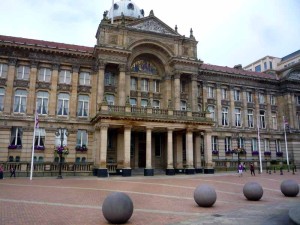Alan Clawley wades through the gloom and doom of budget cuts and asks why Sir Albert Bore is predicting the end of local government as we know it.
 Why can’t councillors apply common sense principles when setting the Council Budget, following in the footsteps of Dickens’s Mr Micawber and Margaret Thatcher whose straightforward philosophy was to ‘live within one’s means’?
Why can’t councillors apply common sense principles when setting the Council Budget, following in the footsteps of Dickens’s Mr Micawber and Margaret Thatcher whose straightforward philosophy was to ‘live within one’s means’?
The answer is that for many years local authorities were not expected to be run like a profit-making business or a household living on a fixed income. They have got used to deciding what ‘essential’ services they would like to provide (as set out in its annual budget) and then going to the government to ask for the money. I believe it is known as Deficit Funding. This must be why the Budget denotes items of ‘Expenditure’ as positive and items of ‘Income’ (in accountant’s brackets) as negative, the opposite of how we normal people think about these things.
There is no doubt that this system has encouraged the expansion of local government as an entity, some would say ‘empire’, as well as providing or paying for many essential front-line services on which people have come to rely. So why should this system be under such pressure from Central Government that Sir Albert Bore is predicting the end of local government as we know it?
Why does central Government want to reduce the amount of money it gives to local authorities? Their spokesperson Eric Pickles – the government minister responsible for local governments – denies that his aim is to decimate essential front line services. He claims that his target is over-staffed back-room management and highly-paid non-jobs. His weapon is the system of Deficit Funding that has encouraged councils to believe that central government would never allow them to go bankrupt. This system has encouraged a game of bluff between local and central government, one not necessarily along party lines.
But councils are not in a strong position to fight their corner. Only 25% of Birmingham’s income comes from local sources, with Council tax payers contributing 10%. 69% of the council’s income is from government grants of various kinds. So central government has the whip hand in their relationship.
Some say that the attack on local government is ideological or party political. Conservatives are said not to like local government at all whilst Labour and the left remain emotionally attached to it. The government says it wants to devolve power to communities in the Big Society, perhaps by-passing local government in the process, and handing out service contracts to its friends in the private and charitable sector.
So setting a council budget is not as simple as ‘living within ones means’. To some extent the council can borrow to pay for what it wants, charge for some services, draw from its cash reserves, and raise Council Tax – the least attractive option. But under the current Deficit Funding regime the amounts raised locally are marginal.
We are left with two questions; does the council spend money on ‘non-essentials’ and should it have to balance its books like businesses and households are expected to do?
The first question can be dealt with initially as a management issue and secondly as a political one. The first involves efficiency measures of all kinds to reduce overhead costs; Councillor Bore now believes that as much as possible has already been done, although Eric Pickles is not convinced. Council buildings are notoriously energy–inefficient still. It is hard for an outsider to know for sure, hence the folk myth of council bureaucracy overstaffing and inefficiency. The second involves a trimming of middle management, again based on a public perception that front-line staff are worked to the bone whilst head office staff spend time devising high level strategies or deciding which of their frontline staff should be cut.
The second question is largely ideological. Those against the idea of running a council exactly like a business believe in the not-for-profit service ethic that has its roots in the post-war Welfare State settlement. Perhaps they have a rather nostalgic view of a world that hardly now exists. Even the Municipal Socialists of Chamberlain’s Birmingham made ‘profit’ providing gas and electricity but any profits were returned to the city. That concept of municipal trading is still alive today in the ICC, NIA and NEC although they have never contributed enough profit to enable the council to cut the rates or become less dependent on central government.
Birmingham’s Net Budget Requirement for 2012/13 is £979,738,000. To reduce that to zero would indeed require drastic cuts. That is not what Eric Pickles is demanding. He and his government are determined to reduce the deficit, but they avoid saying what an acceptable deficit will be. We thus come back to the cat-and mouse game played between central and local government. It seems that as long as the deficit is going down, central government will be happy. What local government fear is that there will be no point at which central government is content with the level of deficit it has to fund and will therefore go on pressing until it reaches zero – the ‘thin-end-of-the wedge argument. Hence Sir Albert’s gloomy announcement that he is staring into the pit of doom.



I’m aware of a specific area in which taxpayer money is being wasted by council staff on solving pseudo-problems. I could say more…..